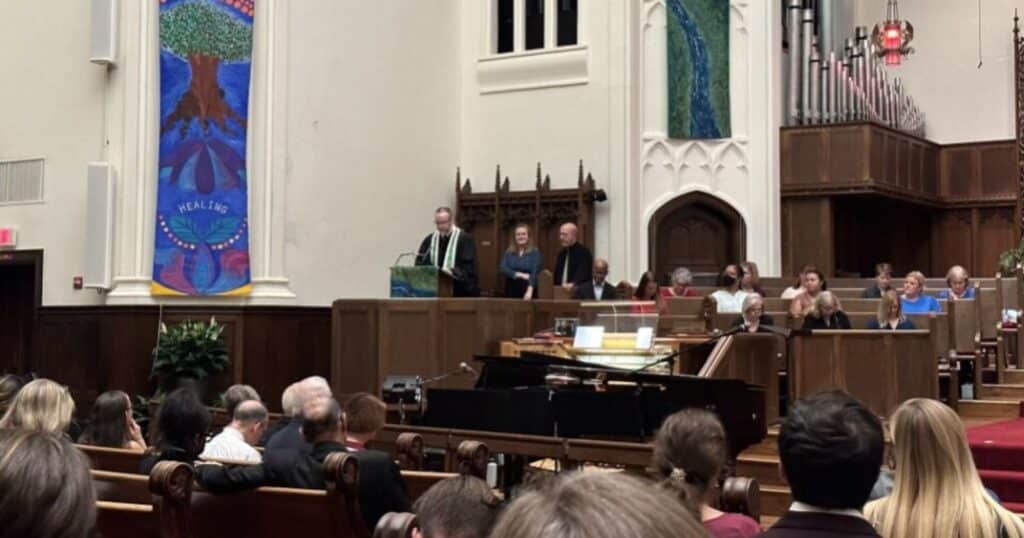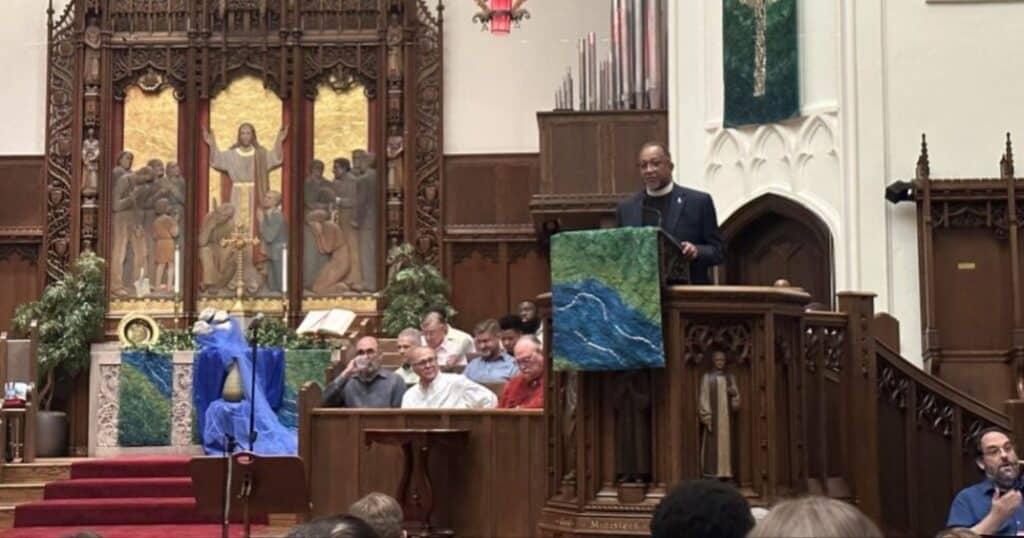‘We’ve come a mighty long way’: Chavis highlights progress at 40th anniversary of Creation Justice Ministries
Creation Justice Ministries, an ecumenical partner of the United Church of Christ, celebrated its 40th anniversary Oct. 26 with a worship service at Foundry United Methodist Church in Washington, D.C.
The event was headlined by a keynote sermon from the Rev. Benjamin Chavis Jr., a longtime UCC minister, civil rights leader and founder of the environmental justice movement. Chavis coined the term “environmental racism” and lead the UCC’s Commission for Racial Justice, which published the landmark report “Toxic Wastes and Race in the United States.”
“We’ve come a mighty long way in 40 years,” Chavis said. “Some of the people that work over at the EPA right now actually worked for the United Church of Christ Commission for Racial Justice. That’s progress. But it’s not enough. Globally speaking, there are still too many people who are harmed because of what we’re doing to the atmosphere, what we’re doing to the climate. And like 40 years ago, when there were denials of environmental justice, today there are denials of climate justice.
“But that’s where faith comes in. Because, to me, faith overtakes our denial of responsibility. Faith gives us the courage, faith gives us the desire to have the right relationship with the Creator. And, to have the right relationship with the Creator means we have to have the right relationship with what the Creator has created.”
On a journey
The celebration’s theme was “We’ve Come This Far by Faith.” And that, Chavis noted, was fitting for the environmental justice movement, which exists because of “all of our struggles, all of our journeys.”
“Faith itself is a journey,” he said. “… And so, we’re here to recognize that, 40 years ago, that journey had a catalyst. That journey had an ecumenical and interfaith affirmation. And as a result, people went to work in a very focused way on the importance of the environment, on the importance of the climate, on the importance of having clean water, on the importance of having clean air, on the importance of not contaminating God’s Earth but trying to restore and nurture all of creation.”
Chavis recalled his early activist days in the Civil Rights Movement and, in particular, his efforts to combat environmental racism in Warren County, North Carolina, around the time the Creation Justice Ministries was born.
“Some of you may know that I was the youngest person on Dr. Martin Luther King Jr.’s staff,” Chavis told the crowd. “I was only 14 years old. I was a youth coordinator for SCLC. And the reason why I bring that up is that what happened in 1982 in Warren County, North Carolina, just didn’t happen as a miraculous event.”
Intersections of justice
During the Warren County protests, Chavis recalled his arrest and, ultimately, a realization about the interconnectedness of movements for justice.
“It was in the context of being in the Warren County jail that I first coined the term ‘environmental racism,’” he said. “And, of course, now the environmental justice movement is just not a local movement or a county movement or a state movement or a national movement. The environmental justice movement is a global movement. Thanks to God that people have found ways to connect, people see the intersection between environment and climate.”
Chavis, bring up the recent violence in the Middle East, also made a plea for recognition among faith communities that all people are part of God’s creation.
“We do have to be our brothers’ and our sisters’ keepers,” he said. “… I’m so thankful for the ministries of the United Church of Christ. The United Church of Christ enabled us to publish the toxic waste and race document. It’s become a landmark study. But I actually grew up in the Episcopal church. And the reason why I bring up these different ecumenical standings is sometimes I think that we allow our denominational label to prevent us from having dialogue with one another. But, to me, we’re all part of one human family, and we all worship, love, respect and are thankful to one God.
“And I say that, not just to my Christian brothers and sisters, but to my Jewish brothers and sisters and to my Islamic brothers and sisters … Why do we fight each other? Why do we kill each other? Why do we disrespect the sacredness of God’s creation, in human form and all forms?”
‘Much to celebrate’
In addition to Chavis, the service included greetings and thanks from many ecumenical leaders, such as the co-executive directors of Creation Justice Ministries, Karyn Bigelow and Avery Davis Lamb; original music composed by Ken Medema, and songs with lyrics written by Cathy Chamblee; and prayers led by interfaith partners, including the Rev. Brooks Berndt, UCC minister for environmental justice.

“We celebrate this milestone, grateful for what you’ve brought us through but mindful of what lies ahead of us” Berndt prayed. “We know that your creation is groaning and waiting for your children to speak up on its behalf. We see the warming temperatures, the droughts and the storms, and we know that you have put us here for such a time.”
Berndt, who serves as vice chair of the Creation Justice Ministries’ board, later praised the four decades of justice work by the interfaith environmental organization.
“For 40 years, Creation Justice Ministries has played a leading role in making the ecumenical connections that allow us to effectively work together as the Body of Christ in addressing some of the most pressing issues facing our world today,” he said. “From the beginning, persons like the Rev. Benjamin Chavis Jr. have realized the importance of acting with a common sense of calling, so that we can further God’s will in seeking justice. When it comes to what we have accomplished and what we will continue to accomplish, there is much to celebrate.”
Jessica Quinn contributed to this story.
Content on ucc.org is copyrighted by the National Setting of the United Church of Christ and may be only shared according to the guidelines outlined here.
Related News
A Prophetic Call for Justice and Peace in Palestine
The executive leaders of the United Church of Christ have issued the following statement...
Read More‘Love is Greater Than Fear’: Regional Youth Events get to the heart of gospel message
United Church of Christ teens attending this summer’s Regional Youth Events (RYE) are...
Read MoreUCC desk calendars available to order now
Prepare for your day, month and year with the United Church of Christ desk calendar —...
Read More


